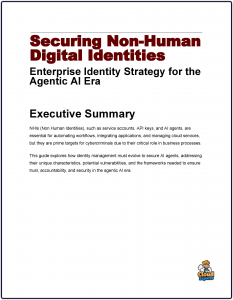How AI Agents Manage Identity & Build Trust in Complex Systems
AI agents, acting autonomously, require secure frameworks to verify their identity, permissions, and authority across distributed environments.
 In complex systems where AI agents drive tasks like supply chain management or financial transactions, robust identity management and trust mechanisms are critical.
In complex systems where AI agents drive tasks like supply chain management or financial transactions, robust identity management and trust mechanisms are critical.
AI agents, acting autonomously, require secure frameworks to verify their identity, permissions, and authority across distributed environments.
This involves identity propagation, token exchange, and transitive trust, supported by standards like OAuth 2.0, OpenID Connect, and APIs, to ensure trust and prevent impersonation in multi-agent flows.
Distinguished Engineer Grant Miller explains identity propagation, token exchange, and transitive trust in agentic systems, and how OAuth 2, OpenID Connect, and APIs ensure trust and prevent identity impersonation in multi-agent flows.
Ai and Digital Identity
Identity propagation enables an AI agent’s identity and permissions to be securely passed through a chain of interactions. For instance, an inventory management agent might authenticate with an identity provider to obtain a JSON Web Token (JWT), then use it to access a supplier’s API.
Each downstream service verifies the token’s signature and claims, ensuring the agent’s legitimacy without re-authentication. This process demands short-lived tokens to minimize misuse risks while preserving context across systems, with revocation mechanisms to handle compromised credentials.
Token exchange, facilitated by OAuth 2.0’s Token Exchange specification (RFC 8693), allows agents to obtain new tokens tailored for specific services while maintaining the original identity’s traceability.
For example, a customer support agent might exchange its CRM access token for one scoped to a billing system, ensuring least privilege access. This granular control and auditability make token exchange vital for secure, flexible multi-agent interactions, enabling agents to delegate tasks without overextending permissions.
Transitive trust extends trust relationships across entities, allowing an agent authorized by a user to delegate tasks to another agent, which a downstream service trusts based on validated tokens. For instance, a user-authorized agent might delegate to a cloud storage agent, with the trust chain relying on cryptographic token verification. However, long trust chains risk over-delegation or misconfiguration, necessitating clear policies and revocation strategies.
OAuth 2.0 and OpenID Connect are foundational to these mechanisms. OAuth 2.0 issues scoped access tokens via flows like Client Credentials for machine-to-machine authentication, ensuring agents access only authorized resources.
OpenID Connect adds identity verification through ID tokens, enabling federated identity and claims-based authorization across systems. APIs reinforce trust by validating tokens, enforcing rate limits, and logging actions for accountability. To prevent impersonation, cryptographic signatures, audience restrictions, and short-lived tokens ensure tokens are tamper-proof and context-specific.
Together, these standards and practices create a secure, scalable framework for AI agents, fostering trust in complex systems while safeguarding against unauthorized actions.



